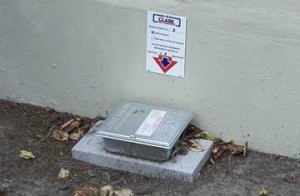Raptors are the solution but… they can’t be the entire solution. There are a variety of effective alternatives to poison. We recommend taking an “integrated pest management” approach to rodents.
Start by finding their source of food, shelter, and water and exclude them from it, or hire a company to help you. Trash and waste are among the biggest attractions for rodents. Make sure garbage bags are tied tightly and secured; if you live in or manage an apartment building, keep dumpsters closed at all times and preferably locked. Follow our best practices to keep rodents out and waste in!
And read Marin County’s very informative poison-free rat management plan.
Other tips on discouraging rats:
- Remove invasive ivy—it’s a luxury hotel for rats. They thrive in it! Replace with native plants that offer habitat for other wildlife and/or plant mint–rats hate it!
- Pick up bird seed waste in your yard. Instead of bulk seed, use seed blocks or cakes that leave less seed on the ground.
- Do not leave pet food out.
- Backyard chicken coops attract rats. Consider installing rat-proof flooring in your coop and elevating it 18″ off the ground (advice from a rat terrier company). Also–according to Backyard Poultry magazine, planting mint around the perimeter of your coop deters rats.
- Compost bins attract rats. Never put greasy food in your compost bin–it is very appealing to rats. If you have a covered compost bin, you might try setting a trap inside it if birds and other wildlife cannot get into it. Also, install hardware cloth under the compost bin, so rats cannot tunnel up into it. Better yet, try a spinning composter–they seem to be much harder for rats to infiltrate. Here is one such example.
- Consider installing a barn owl box—but ONLY if everyone in your neighborhood commits to not using poison. See the Hungry Owl Project for more information and tips.
For information about gopher problems, check out Gophers Limited.
A few warnings:
Any time you see a “bait box” with an exit hole—beware. If the box contains poison, it should be labeled as such. If it contains a trap instead, it must be labeled—otherwise, the box likely includes poison.
 Rats and mice can “check in,” eat poison, and then check out, easily becoming food for a hawk, an owl, other wildlife, or your pet cat or dog. Bait boxes are not safe for wildlife unless you get them from a company that uses snap traps inside them. (Most do not.) They should never be used out in the open where songbirds can get caught in them.
Rats and mice can “check in,” eat poison, and then check out, easily becoming food for a hawk, an owl, other wildlife, or your pet cat or dog. Bait boxes are not safe for wildlife unless you get them from a company that uses snap traps inside them. (Most do not.) They should never be used out in the open where songbirds can get caught in them.
Most large pest control companies still use poison in their bait boxes. If you hire a pest control company, insist that they not use poison. Demanding poison-free solutions helps reduce the market for poison. And a WORD OF CAUTION: Please do *not* use glue or sticky traps. They are cruel and inhumane and also catch songbirds, small owls, and other small animals who often have to be euthanized as a result.
If you are using a traditional pest control company, tell them you do not want any poison used. If there is a big enough market for exclusion and humane solutions, the poison will eventually stop: the poison cycle equals profits for pest control. Another option is to try a working rat terrier pack; check out JR Reed and his Mongol Hoard: http://themongrolhoard.com/index.php/stock-information/
This site sells both home and commercial rodent exclusion products.
In general, these pest control companies do not use poison:
Parker Eco Pest Control (Seattle)
The Hit Men (SF Bay Area)
Pestec (SF Bay Area)
Landmark Pest Management
(Chicago)
You can sometimes find poison-free companies by searching for “integrated pest management” in your area. Be sure to let whatever company you hire know that you do not want poison used. You can also try hiring a rat terrier company (such as JR Reed). This method is quick and poison free.
While we do not “endorse” products, some products used to deter rodents include:
- Cayenne pepper – Rats hate it and you can sprinkle it in their pathways or known nest sites. You can use it in compost bins, bird feeders, and chicken coops; it will not harm or repel birds or chickens.
- Fresh Cab – A botanical repellent
- Rataway
- DeTour
- Raticator – An electronic trap that can also be used inside a bait box
- Irish Spring soap – it really works and is easy to find at your local grocery store
- Mouse Magic
As a last resort, use snap traps inside a bait box and only in locations—i.e., a garage—where no other animals can reach them. Never use snap traps in the open! Birds have been caught, and skunks and other animals that help control rodents seriously injured. Be sure to check and empty the traps regularly. There are many brands of inexpensive, reusable snap traps, like this one.
